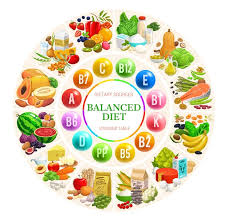10 Reasons to Eat More Fruits
& Vegetables

The food we eat today is far from nature. No matter how much we try to
shop healthy, most of the food we find on grocery store shelves is processed.
Processed foods are loaded with additives that eventually harm our bodies in
multiple ways. Otherwise, when we don't try to do groceries, it inevitably
leads to cheese-laden pizza for dinner. The study of the effects of processed
foods and junk food on our bodies is terrifying. No wonder the risks of heart
disease, diabetes, and obesity are higher in recent times. The best solution is
to eat a natural diet. So fruits and vegetables are your best food
options. Here are 10 reasons why you should include fruits and vegetables in
your daily diet.
1. Great Sources of Vitamins & Minerals

Both fruits and vegetables are full of vitamins and minerals that are
essential for our body. Finding a good source of nutrition from these food
groups is quite a task. Vitamins A, C, and E are abundant in fruits and
vegetables. In addition, they include additional very advantageous components
like folic acid, magnesium, zinc, phosphorus, and others. For example,
avocados, tomatoes, bananas, and potatoes are excellent sources of potassium, which
is essential for the body.
2. Textures & Flavors

The colors, unique textures, and flavors make plant-based foods not
only healthy to eat, but a very interesting kitchen ingredient. You'll be able
to get creative in the kitchen with the strong flavors of onion, garlic, and
pepper. Or you can choose lighter options that suit your taste like corn and
mushrooms. If you want to add some sweetness to your breakfast, lunch or
dinner, you can go with fruit options. You can use plums, pineapple or grapes
for this. Finally, if you want to enjoy a sour taste, lemon grapefruit will
come to the rescue.
3. Great Source of Fiber

Fruits and vegetables are both great providers of dietary fiber. Fiber
is an important nutrient for the body that comes with many health benefits. If
the body is not getting the required amount of fiber, it can lead to some
serious problems. Vegetables generally contain more fiber than fruits.
Therefore, vegetables protect the health of the intestines. Also, vegetables
can keep you fuller for longer, so they help in weight loss. Some vegetables
that are rich in fiber include cabbage, green peas, and broccoli. Fruits that
are high in fiber include apples, pears, pumpkin, and raspberries.
4. Protection against Diseases
Plant-based foods contain phytochemicals. Phytochemicals are substances
that are biologically active and can protect against many diseases. That's why
plant-based foods are considered best for preventing cancer, diabetes, heart
disease, high blood pressure, etc. Cruciferous vegetables such as broccoli,
collards, and cabbage are highly regarded as cancer-preventing foods. Therefore,
a fixed portion of your regular diet should consist of these food groups.
Taking preventive measures to prevent disease is easier than treating the
disease.
5. Low in Calories
These food groups are fairly low in calories and fat, which is why they
should be your first choice when you're trying to lose weight. Plant-based
foods have a minimal number of calories and are also good for keeping you
hydrated. Including them in your diet means that you will stay fuller for
longer and that too by consuming fewer calories. Fruits are good for curbing
your sugar cravings. Instead of eating M&Ms, you may indulge your sweet
taste and reap several health advantages by eating a cup of grapes. However, there are some exceptions. For
example, olives, coconuts, and avocados are high in calories and do not help
with weight loss.
6. Necessary to Maintain Good Health
Fruits and vegetables have amazing nutritional properties that make
them ideal for maintaining good health. These foods are very low in salt, sugar, and saturated fat, which is why they pose minimal health risks. They not only
cure diseases but also protect the body from diseases by providing antioxidants.
Fruits and vegetables will help you reduce inflammation as well as lower blood
pressure and cholesterol levels. Eating a plant-based diet can also help you
enjoy a longer life.
7. Low in Sodium & Cholesterol
The sodium content of fresh fruit is almost negligible. The same is the
case with vegetables. The trace amount of sodium in these foods makes them
healthy. Celery, considered to contain the highest amount of sodium, contains
30 milligrams of sodium in one stalk. It contributes 1% of daily requirements.
On the other hand, cholesterol is completely absent in these planar items. You
can eat these foods without fear of high cholesterol.
8. Convenient & Easy To Access
Plant-based foods are available literally everywhere you go. Unlike any
other food, they are easily accessible. No matter where you live, enjoy
regional and seasonal vegetables and fruits to the fullest. After adopting a
plant-based diet, you will see noticeable changes in your health. If you are
not used to consuming these foods at all, start by adding small amounts. Make
sure to include at least some of these foods in your diet.
9. Nutritious In All Forms
You can freeze these foods, or freeze them, and they will provide you
with all the nutrients you need. Freezing and canning vegetables will increase
their shelf life and make them easier to use. Dehydrated fruits also have a
longer shelf life. Products that are canned and frozen are often prepared
shortly after harvest. For this reason, nourishment is cut off right away.
10. Smoothies!
If you have a blender, all you need is some ice and fruit to make a
delicious smoothie. Smoothies are probably the easiest and most fun way to
consume plant-based foods. The best part is that you can choose your favorite
flavor and prepare your smoothie instantly, wherever you are.





0 Comments